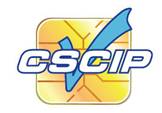CSCIP/Government Body of Knowledge

Smart Card Fundamentals
- Basic smart card components, structure, functions
- IC types (memory, protected memory, microcontroller, RF)
- Card design and card body
- Formats (card, USB token, SIM, embedded, other)
- Communications interfaces (contact, contactless, dual interface)
- Memory size and types
- Operating systems (native, Java, Multos, other)
- Smart card system design features
- Manufacturing process
- Readers (POS, PC, access control)
- Relevant smart card standards (ISO, ANSI)
- Smart cards and biometrics
- Specifications
Security
- Certifications (FIPS, Common Criteria)
- IC level (anti-tampering, masking)
- Card edge interface
- Encryption algorithms
- Security at system level
- Physical
- Logical
Smart Card Application and Data Management
- Single application cards
- Multi-application cards
- Chip initialization
- Key management (symmetric, asymmetric)
- Issuance
- Card life cycle management
- Relevant standards
Smart Card Usage Models: Identity and Security
- Smart card drivers and benefits
- Identity cards and tokens
- ePassports
- Physical/logical access
- Smart cards and biometrics
- Smart cards and digital certificates
- Sample smart card identity and security models
- Relevant standards
- Identity and security application examples
- Privacy
FIPS 201, the PIV Card and Federal Identity Management
- FIPS 201 common identity, security and privacy requirements
- The PIV system
- The PIV card
- PIV card issuance and lifecycle
- FIPS 201 and biometrics
- Federal assurance and authentication levels
- FIPS 201/PIV card physical access use cases
- FIPS 201/PIV card logical access use cases
- FIPS 201/PIV card certification, testing and acquisition
- PIV-I interoperability beyond the Federal government
- Federal public key infrastructure
- Federal identity, credential and access management guidelines
